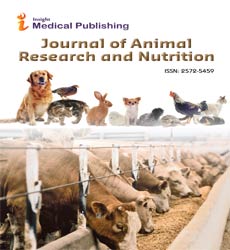Abstract
Role of In-feed Probiotics on Performance and Health of Animals: A Review
Bacterial resistance and residual effects are the primary reasons for the prohibition of antibiotics incorporation as growth promoters in animal nutrition. Therefore, to date researchers and nutritionists are in searching of ideal alternatives to antibiotics which able to best optimize productivity without adverse effects. The utilization of microbial probiotics in farm animals feeding has become a popular approach in recent years and gains a scientific concern regarding their potentials and limitations. Probiotics are commonly defined as viable microorganisms that are used as feed additives in commercial livestock farming. Selected strains of bacteria, yeast and fungus (alone or in combination) which possess beneficial properties on digestive process or animal health are utilized in their preparations. These microbes in the digestive tracts of livestock have a profound influence on maintaining the balance of micro flora which can impact on the animal performance and health. Studies revealed that certain animal feed probiotics enhanced immunity, digestive efficiency and overall productivity without adverse effects to users and environment. However, these improvements in livestock performance have not been consistently achieved although several beneficial assertions have been documented. Moreover, the mode of action for probiotics is also continued as a chronic issue and still it is not fully explained. This review tries to summarize the information to date on the microbes of in-feed probiotics, their role in animal productivity and the possible modes of action.
Author(s):
Yimam SA *
Abstract | PDF
Share this

Google scholar citation report
Citations : 764
Journal of Animal Research and Nutrition received 764 citations as per google scholar report
Abstracted/Indexed in
- Google Scholar
- China National Knowledge Infrastructure (CNKI)
- WorldCat
- International Committee of Medical Journal Editors (ICMJE)
- Secret Search Engine Labs
Open Access Journals
- Aquaculture & Veterinary Science
- Chemistry & Chemical Sciences
- Clinical Sciences
- Engineering
- General Science
- Genetics & Molecular Biology
- Health Care & Nursing
- Immunology & Microbiology
- Materials Science
- Mathematics & Physics
- Medical Sciences
- Neurology & Psychiatry
- Oncology & Cancer Science
- Pharmaceutical Sciences

